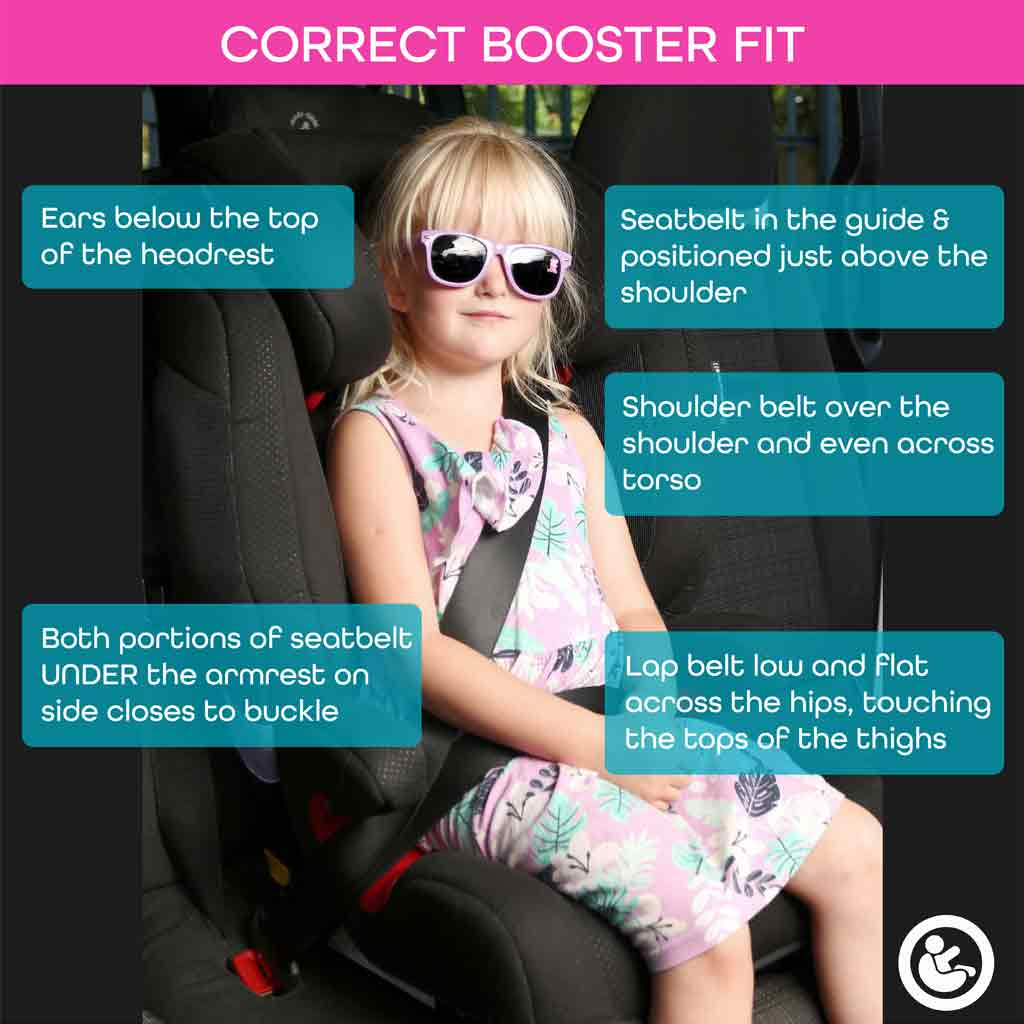

WRITTEN BY JULIE MONSON
Occupational Therapist &
Certified Car Seat Technician
WHAT ARE BOOSTERS?
Booster seats are belt positioning devices, in other words, they position the vehicle seatbelt into a safer position across your child's torso. They are suitable for children who are booster ready; that is over 4 years, 100cm and 15kg. Boosters have a cushion/seat to raise a child up. They can have a backrest, called a highback booster. Or if they lack a backrest, they are called backless boosters.
WHAT IS A HIGHBACK BOOSTER?
A highback booster has a seat portion as well as a backrest. It uses the vehicle's 3-point seatbelt to restrain the child. Most highback boosters also have a height adjustable headrest, to provide protection to the neck and head as they grow.
The seat part of the booster raises your child up on the vehicle seat, and guides the lapbelt low and flat across the strong bones of the hips, touching the tops of the thighs NOT over the abdomen where all the vital organs are situated. The red/green seatbelt guides of the highback booster's headrest positions the shoulder belt evenly across your child's shoulder, away from their neck. Some highback boosters have isofix, while others do not have this feature.

WHAT IS A BACKLESS BOOSTER / BOOSTER CUSHION?

Backless boosters raise a child up in order to get a safer lapbelt fit over their hips. However, they offer no side impact protection whatsoever to the torso or the head and neck.
Are highback boosters safer than backless boosters?
Yes, highback boosters offer a safer seatbelt fit and better protection than backless boosters. You will see in the crash test video below that the dummy is poorly contained in the backless booster, and strikes the door and window of the car violently. Booster cushions offer absolutely no side impact protection and do not support the spine or head.
In the highback booster, the child is better contained in the seatbelt and better protected by the side wings of the booster. The child's head and torso are cushioned by the booster shell.
Of course, if you are unable to afford a highback booster or if you are travelling or doing an occasional lift club, a backless booster would be better than nothing. However, the point we are trying to make is a that a highback booster is SAFER than a backless booster.

WHY DO CHILDREN NEED HIGHBACK BOOSTERS?
1. Highback boosters position the seatbelt safely
A seatbelt is designed to fit and protect adults over 1.5m, but can cause serious or even fatal injuries to shorter children. This is due to the fact that an adult seatbelt, when used without a booster seat, places the seatbelt dangerously over a child's body. The lapbelt rides up over a child's abdomen, which could damage their internal organs in a collision. The shoulder belt fits too close to a child's neck, which can result in disabling injuries in a crash.
Booster seats raise children up so that seatbelts lie across the strong bones of the chest and pelvis instead of the abdomen and neck, where they could do serious damage in a crash.
Achieving a safe seatbelt fit is vital to restrain your child adequately in the event of a collision.
A Safe Seatbelt Fit should achieve:
- Ears should be below the top of the headrest
- Seatbelt should be in the red or green guide and positioned just above the shoulder (not cutting in the neck) and even across the torso.
- Both portions of seatbelt should be placed UNDER the armrest on side closest to buckle
- Lap belt should be low and flat across the hips, touching the tops of the thigh NOT over the abdomen

2. Highback boosters provide protection
Most highback boosters have deep, padded side wings to offer protection and support to the head, neck and torso in the event of a collision, as well as side impact protection. New iSize crash testing criteria requires that boosters pass a side impact collision of 25km per hour. Previously, boosters approved to the older R44/04 regulation were not required to pass a side impact collision crash test.
ARE BACKLESS BOOSTERS ILLEGAL?
In the Uk, the rules on backless boosters changed from 1 March 2017. These seats can now only be made for children taller than 125cm and weighing more than 22kg. It is now illegal in the UK for children under 22kg and 125cm to use a backless booster.
This does not mean that backless boosters are illegal, it just means that new models of backless booster seats will only be suitable for children taller than 125cm or weighing more than 22kg. The Department of Transport Government website confirms that the new rules don’t affect current models of backless boosters and booster seats.
On 1 May 2015 a new law came into effect in South Africa that makes it illegal to for an infant (a child under 3 years) to travel without being strapped into a suitable car seat.
Reg213. (1C) An infant is a person below the age of three years Reg213. (6A) The driver of a motor vehicle operated on a public road shall ensure that an infant traveling in such a motor vehicle is seated on an appropriate child restraint: Provided that this provision shall not apply in a case of a minibus, minibus or bus operating for reward.
So whilst it is not illegal for a child to use a backless booster in South Africa, it is not safest for them.
In the UK, Britax launched a campaign “Bin the Booster Cushion”, urging parents to rather use highback boosters. Both a booster cushion and a highback booster were put through a simulated frontal collision, with the highback booster providing far more support. The child-sized dummy in the booster cushion was violently thrown forward and hits its head on the side of the vehicle, dangerously freeing itself from the upper belt, whereas the dummy placed in the highback booster is kept in place and protected by the side wings and headrest. It is recommended that children travel in the high back booster if they are the correct weight and height for it, and fit comfortably within the headrest. A high back booster provides additional head, neck and torso protection. (Good Egg Car Safety)
What are the minimum requirements to use a backless booster?

Under the new regulations, children need to meet the following minimum criteria in order to use a backless booster:
- Be at least 125cm in height
- Be at least 22kg in weight
- Be 7 years or older
How long should children use boosters?
Although the Law does not differentiate between a child being strapped with a normal seat belt and a child car seat/booster, crash testing shows that children under 1.5m are MUCH safer in boosters.
Seatbelts are designed to protect adults over 1.5m tall, and can cause severe or even fatal injuries in children. Children strapped with just a seatbelt before they are tall enough to achieve a safe seatbelt fit were found to be 3 times more likely to be injured in a crash than adults.
It is therefore recommended that children use boosters until they reach 1.5m and pass the 5-step test. For most children, this is only when they are 10-12 years old.
 Photo credit: The Car Seat Lady
Photo credit: The Car Seat LadyIN CONCLUSION
In short, although it is not a legal requirement for children over 3 years to even use any kind of booster seat, crash test data and statistics prove conclusively that children under 1.5m (150cm) are best protected by a booster seat. Although it is legal for children over 125cm and 22kg to use a booster cushion, research shows conclusively that it is safest for children to use a highback booster rather than a backless booster.
Children over 4 years/18kg/105cm and under 1.5m are best protected by highback boosters.
SAFEST BOOSTERS
We sell the highest safety rated boosters at Precious Cargo
Booster Seat Collection
Click the button below to view our collection of the highest safety rated highback boosters
BUY NOWREFERENCES
https://www.preciouscargo.co.za/blogs/car-seat-support/car-seats-and-the-law-in-south-africa
https://www.which.co.uk/news/2021/08/are-parents-getting-the-message-about-backless-booster-seats/
https://www.pushchairexpert.com/en/news/is-it-time-to-bin-the-booster/
https://www.madeformums.com/news/booster-seat-law-uk-changes-and-updates/
https://www.carseatadvice-uk.com/car-seat-testing.html
https://www.britax-roemer.co.uk/media-press/press-releases?article=PressRelease-BinBoosterCampaign-0715
https://www.goodeggcarsafety.com/blog/tags/booster-seats.html

